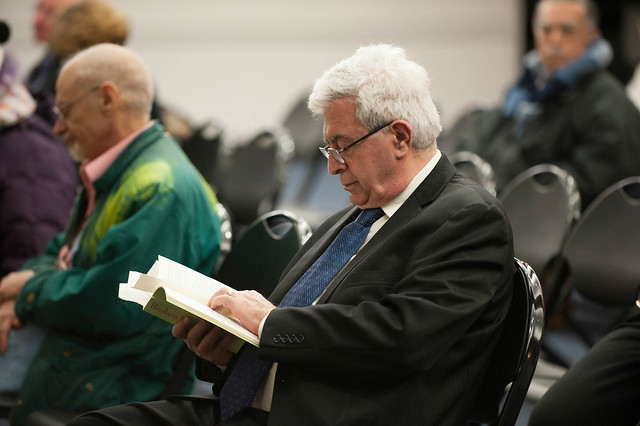Event Highlights: The Arab World Meets Europe: A Reading and Conversation with Elias Khoury and Jocelyne Cesari
On Wednesday, March 2, the Center for the Study of Europe, in another collaboration with Archipelago Books, hosted Lebanese author Elias Khoury, who read from his latest novel in English translation, Broken Mirrors (Archipelago Books, January 2016). The novel follows Karim, a Lebanese doctor who has escaped the civil war by emigrating to France, as he returns to Beirut like a “criminal returns to the scene of his crime.”
Responding to Elias Khoury was Jocelyne Cesari, Professor of Religion and Politics at the University of Birmingham, UK, Senior research fellow at Georgetown University’s Berkley Center on Religion, Peace and World Affairs. Cesari’s remarks centered around the ongoing revolutionary process in the Middle East and its impact on Europe’s future.
Elias Khoury, born in Beirut, is the author of thirteen novels, four volumes of literary criticism, and three plays. He was awarded the Palestine Prize for Gate of the Sun, which was named Best Book of the Year by Le Monde Diplomatique, The Christian Science Monitor, and The San Francisco Chronicle, and a Notable Book by The New York Times. Khoury’s Yalo, White Masks, Little Mountain, The Journey of Little Gandhi, and City Gates are also available in English.
Khoury began with a brief overview of his latest book, which takes place in 1989-90, the year when the Lebanese Civil War officially ended. Khoury emphasized the fact that the Lebanese Civil War never ended, and was merely a rehearsal for the conflict we are seeing in Syria today, which he noted as the greatest human tragedy since World War II. Khoury explained how, rather than begin a story with “once upon a time”, the phrase “it was or it was not” is used in Arabic, exemplifying the interchangeability between reality and the imaginary, something that Khoury considers a defining aspect in his identity as a writer. Summarizing the plot as the story of a cynical and detached pharmacist with two sons living in the Christian eastern part of Beirut, Khoury outlined the ideological split between these men during the civil war and the ensuing paradoxes facing them. Following this brief introduction to Broken Mirrors, Khoury read several passages which demonstrated the realities of war, and the emotional impacts conflict has on relationships. Khoury then read the text in its original written Arabic, mesmerizing the audience through the fluidity of the naturally spoken story.
Jocelyne Cesari began her commentary by highlighting the mosaic of unique characters, political perspectives, and emotional “assemblage” created by Khoury in Broken Mirrors. She praised Khoury’s ability to assert, through his strong characters, how the civil war in Lebanon never ended for the people. Cesari explained that, while the state may have signed a treaty and textbooks cite a specific date marking the official end of the war, in reality there has been no peace for the people. Continuing, she emphasized the concept of “negative peace”, which she explained as the condition under which individuals fail to come to terms with themselves, with others, or with the situation they have survived. In essence, Cesari argues that Lebanon faces division in both religious and ethnic differences, and that all people are prisoners of the “sectarian political chess game… there is no fluidity, no democracy.”
Posing a question for Khoury, Cesari compared the refugee situation of the 1980s in Lebanon (when the nation took in thousands of Palestinians) to the current upheaval and Syrian refugee crisis, asking about the long-term implications for Lebanese democracy, sectarian divides, and the tensions between the various religious groups represented in the country. This was followed by a question about the Muslim challenges facing Europe, and Khoury’s response was direct in addressing the fact that the European situation has been the evolution of the Syrian refuge crisis into an internationally recognized issue. However, Khoury pointed out that both the Lebanese and the Turkish have been taking in thousands of Syrians each year since the civil war began, resulting in the nation of Lebanon, with 3.5 million people, taking in 1.5million Syrians. Khoury is disgusted at the homogenous perspective of Europe, particularly given the European past in handling minorities (citing examples of WWII), passionately exclaiming “This madness. Europe MUST adapt.” He continued by addressing how Europe needed immigrant workers to fulfill declining populations across the continent, but how the rise of Right wing movements have led to resistance to multiculturalism in Europe. By comparison, Khoury explained, Lebanon has equally struggled with racism but has always adapted, in a region facing extremities in secularism and various religious groups.
The final question posed to the speakers was asked by a Syrian refugee, who asked for the opinions of both Khoury and Cesari on how true peace can be achieved in the face of Syrian calls for ceasefire. Khoury explained how only through emphasis of democracy and defeating the cult of Syrian dictatorship will stability be achieved. Alternatively, Cesari referred to her previous statements about the Lebanese population never having come to terms with their experience and with one another, arguing that before a new political regime is established, the population of a nation must be at peace with itself. The conversation ended with Khoury’s call to action, stating that only when human values are taken into consideration will the true meanings of tolerance and justice be understood to the extent necessary to successfully end conflict.
The event was co-sponsored by the Institute for Iraqi Studies, the Institute for the Study of Muslim Societies and Civilizations, the Middle East and North African Studies Program, and the literary journal AGNI.

